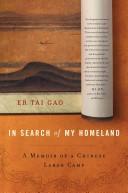General
| Subtitle: | A Memoir of a Chinese Labor Camp |
|---|---|
| Author: | Gao, Ertai |
| Editor: | |
| Binding: | |
| Purchase Date: | |
| Purchase Price: | |
| OpenLibrary Link: | http://openlibr...ooks/OL24796257 |
Publishing
| Publisher: | Ecco Press |
|---|---|
| Edition: | 1st Ed. |
| Copyright Year: | |
| Publication Year: | 2009 |
| ISBN#: | 978-0-06-088126-9 |
| LCCN#: | 2010362349 |
| Pages: | 259 |
| Translator: | |
| Language: | English |
Classification
| Genre: | |
|---|---|
| Keywords: | Political prisoners; Concentration camps; Biography |
| Series: | |
| Series Number: | |
| Condition: |
Comments
The memoir of Er Tai Gao, a chinese artist, art critic, and intellectual who spent twenty years in and out of china's gulag until his escape to freedom in hong kong in 1992 and his defection to america in 1993
In 1957, twenty-two-year-old art teacher Er Tai Gao came to the attention of the Communist Chinese authorities with his groundbreaking essay “On Beauty,” in which he argued that the nature of what is beautiful is both subjective and individual—a position in direct opposition to government policy. Labeled a “rightist” by the Mao regime, Gao was sent to a labor camp in China's harsh western desert, where in just three years 90 percent of his fellow prisoners died. It would be the first of the scholar's three convictions for subversive thought and behavior. After his last imprisonment, in the aftermath of the Tiananmen Square protests, Gao and his wife, Maya, escaped to Hong Kong, and in 1993 were offered political asylum by the United States.
Epic in scope, reaching from the depths of work ditches in the Gobi Desert to the heights of the Buddhist heavens depicted on the Dunhuang cave ceilings, In Search of My Homeland is a striking portrayal of Gao's experiences of political persecution, of prisoners pushed to the limits of human endurance, and ultimately of the power of hope. Gao's enormous skill as a writer and insightful observer offers a unique, thoughtful perspective on China in the second half of the twentieth century.
Powerful and elegantly written, Gao's work teaches us that freedom is the most important political stand for an artist, to be able to dissent from the dominant ideology—thereby making beauty, both its creation and perception, its ultimate symbol.
